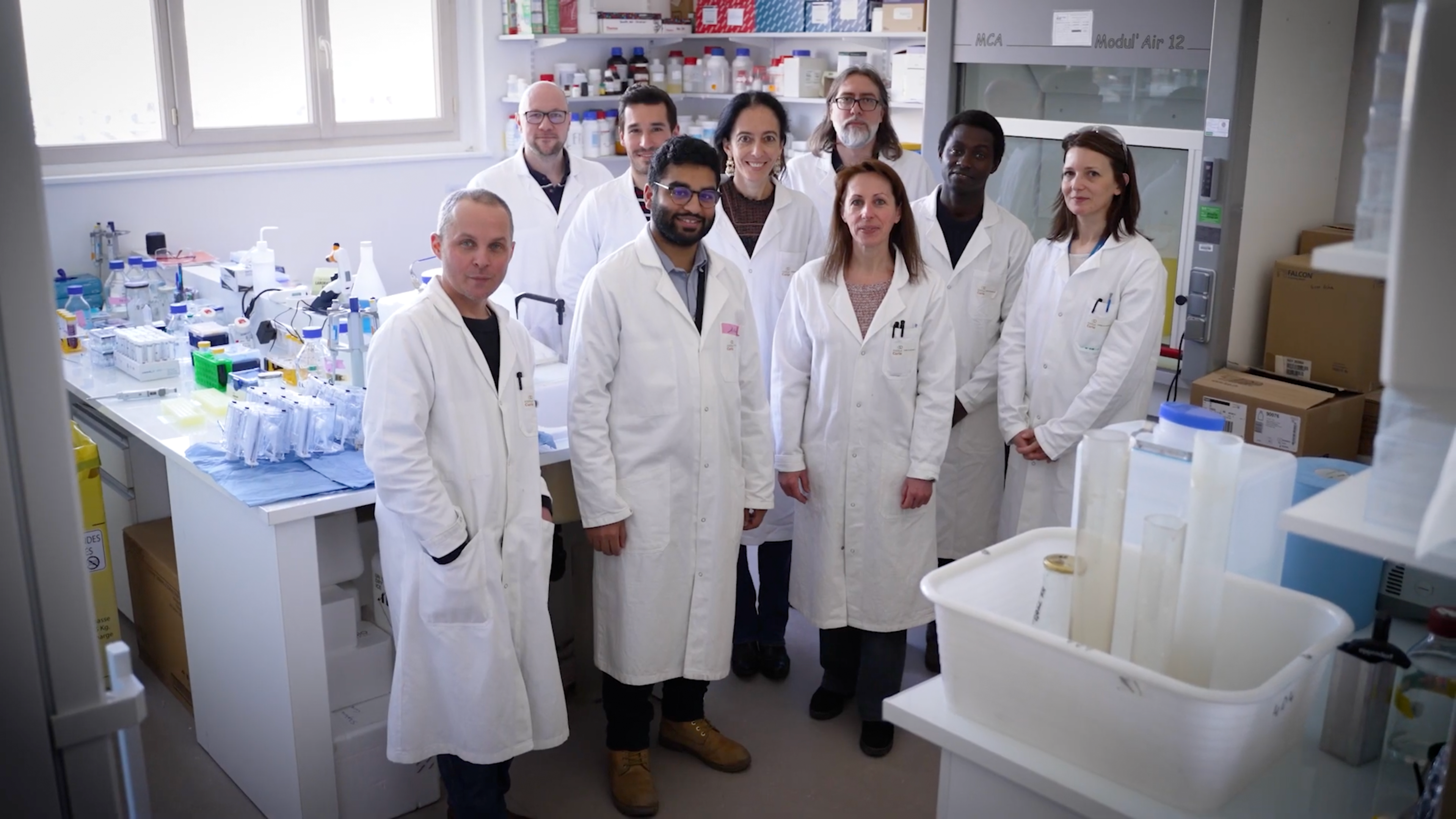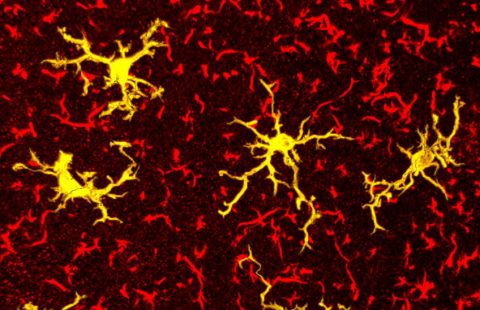 The research team developed a “drug prototype” capable of mitigating both the mechanisms of inflammation and the processes potentially involved in metastatic spread. © Institut Curie / BELONCLE Frank
The research team developed a “drug prototype” capable of mitigating both the mechanisms of inflammation and the processes potentially involved in metastatic spread. © Institut Curie / BELONCLE Frank
For the first time, researchers from Institut Curie, the CNRS and Inserm have uncovered a previously unknown chain of biochemical reactions. This chain involves copper and leads to metabolic and epigenetic alterations[1] that activate inflammation and tumorigenesis. But there is more; the research team developed a “drug prototype” capable of mitigating both the mechanisms of inflammation and the processes potentially involved in metastatic spread. Published in the journal Nature on April 26, 2023, these results provide hope for new therapeutic opportunities to control inflammation and cancer.
Inflammation is a complex biological process that can eradicate pathogens and promotes repair of damaged tissues. However, deregulation of the immune system can lead to uncontrolled inflammation and produce lesions instead. Inflammation is also involved in cancer. The molecular mechanisms underlying inflammation are not fully understood, and so developing new drugs represents a significant challenge.
As far back as 2020, Dr. Raphaël Rodriguez, CNRS research director and head of the Chemical Biology team at Institut Curie (Equipe Labellisé Ligue Contre le Cancer) at the Cellular and Chemical Biology laboratory (Institut Curie/CNRS/Inserm), had shed new light on a membrane receptor called CD44, which marks immune responses, inflammation and cancer progression. Dr. Rodriquez and his team showed that CD44 helped import iron into cell[2], triggering a series of reactions leading to activation of genes involved in the metastatic process.
“This is a cell plasticity phenomenon we continued to study, investigating other metals potentially internalized by CD44, notably copper,” he explains.
Copper causing epigenetic alterations

Along with his colleagues[3], Dr. Rodriguez has now reached a new milestone.
The research team managed to identify a signaling pathway involving copper and leading to the expression of pro-inflammatory genes in macrophages, the cells present in all tissues and playing an important role in innate immunity.
Once internalized in macrophages, copper enters into the mitochondria (the organelle responsible for cell respiration and energy production), where it catalyzes the oxidation of NADH into NAD+ (nicotinamide adenine dinucleotide, a molecule needed for the activity of certain enzymes). The increase of NAD+ in cells enables the activity of certain enzymes involved in the production of metabolites essential for epigenetic regulation. These metabolites thus, contribute to the activation of genes involved in inflammation.
Inflammation and cancer: shared molecular mechanisms
The scientists did not stop there, they also designed molecules able to bind to copper, inspired from the structure of metformin.[4] By testing these new molecules on models of acute inflammation, they found that a synthetic dimer of metformin, LCC-12 (also termed Supformin), reduced activation of macrophages and attenuated inflammation.
“Our work has enabled us to develop a drug prototype that inactivates copper chemistry in the cell’s metabolic machinery, thus blocking expression of the genes involved in inflammation”, explains Dr. Rodriguez.
To finish, they applied this therapeutic strategy to cancer cell models engaged in an epithelial-mesenchymal transition[5]. Here again, Supformin blocked the cellular mechanism and thus the cell transformation.
“The genes activated in cancer cells are not the same as those expressed in immune cells, but the chain reaction leading to epigenetic alterations is identical”, explains Dr. Rodriguez.
These results thus reveal the role of copper in cancer cells and their ability to adopt a metastatic nature.
Dr. Raphaël Rodriguez concludes: “Our study reveals that the inflammatory and cancer processes depend on similar molecular mechanisms and could therefore in the future benefit from similar innovative therapies, such as those tested with Supformin.”
The explanations of Dr. Raphaël Rodriguez in video :
[1]Epigenetics is the study of the mechanisms at play in gene regulation, which is essential to the action of cells and to maintaining their identity. Unlike genetic mutations, which are permanent, epigenetic modifications on DNA or histones are reversible.
[2] Read the press release “Cancer: a new mechanism that regulates cell activity involving iron”: https://curie.fr/sites/default/files/medias/documents/2020-08/CPCNRS-CD44ferCancer-FR-emb.pdf
[3] This study was conducted at Institut Curie, in the Cellular and Chemical Biology unit (Institut Curie, CNRS, Inserm), in collaboration with UVSQ, Raymond Poincaré hospital (AP-HP), Gustave Roussy hospital, the Institut de chimie moléculaire et des matériaux d’Orsay (CNRS/University Paris-Saclay), the Multimodal Imaging Center (CNRS/Institut Curie/Inserm/University Paris-Saclay), the Center for Infection and Immunity of Lille (CNRS/Inserm/Institut Pasteur de Lille/CHU of Lille/University of Lille), Institute of Pharmacology and Structural Biology (CNRS/University of Toulouse III) along with British and Australian researchers.
[4]Metformin is a treatment used for Type-2 diabetes, and is able to form a bimolecular complex with copper.
[5] Epithelial-mesenchymal transition is the first step in enabling cancer cells to metastasize.
These contents could be interesting :
A druggable copper-signalling pathway that drives inflammation
Stéphanie Solier, Sebastian Müller, Tatiana Cañeque, Antoine Versini, Arnaud Mansart, Fabien Sindikubwabo, Leeroy Baron, Laila Emam, Pierre Gestraud, G. Dan Pantoș, Vincent Gandon, Christine Gaillet, Ting-Di Wu, Florent Dingli, Damarys Loew, Sylvain Baulande, Sylvère Durand, Valentin Sencio, Cyril Robil, François Trottein, David Péricat, Emmanuelle Näser, Céline Cougoule, Etienne Meunier, Anne-Laure Bègue, Hélène Salmon, Nicolas Manel, Alain Puisieux, Sarah Watson, Mark A. Dawson, Nicolas Servant, Guido Kroemer, Djillali Annane et Raphaël Rodriguez.
Nature. 26 April 2023.

